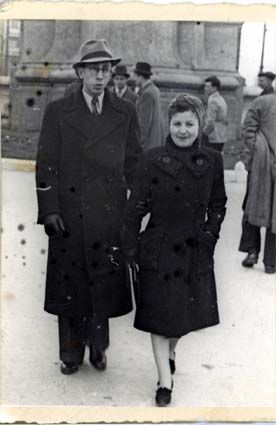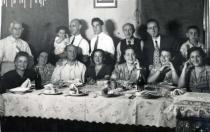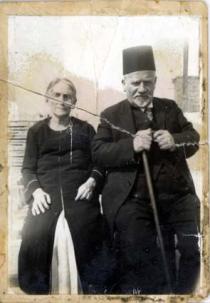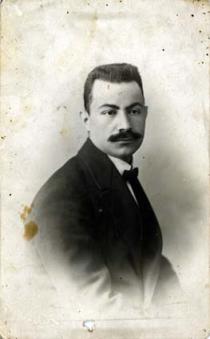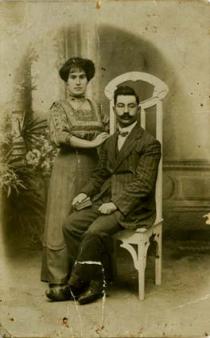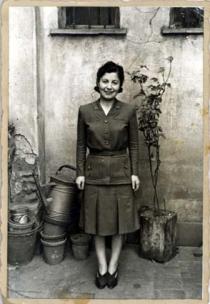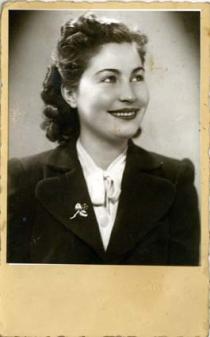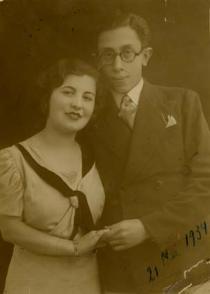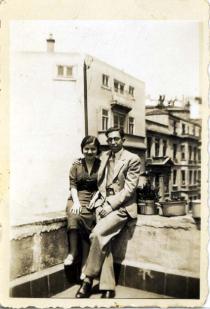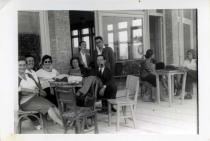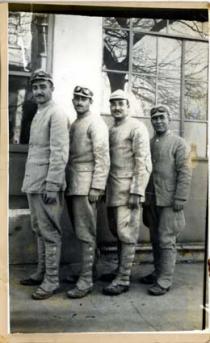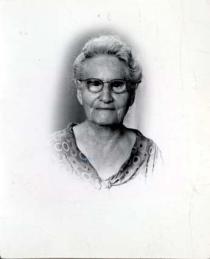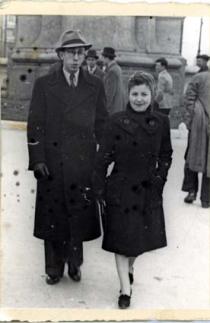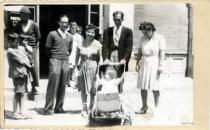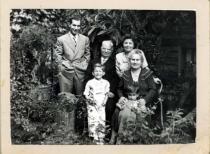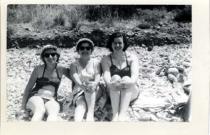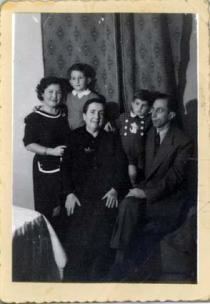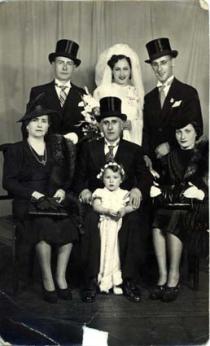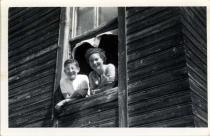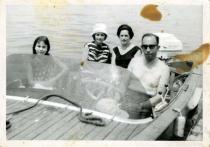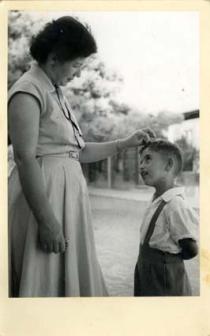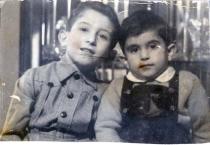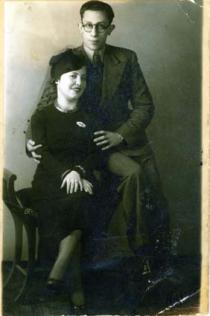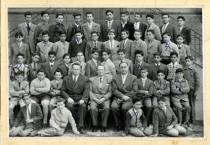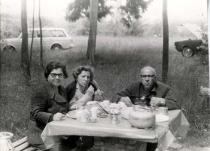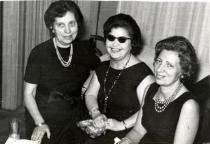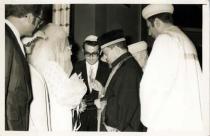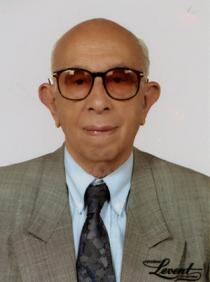This photo was taken in Taksim Square by a professional photographer who used to roam the square looking for business. My wife and I were on an outing at Taksim that day. It must have been winter looking at the clothes we are wearing.
My wife, Suzan, is from Istanbul. She was born and raised in Kuzguncuk [a district in the Asian side of Istanbul]. My wife's English was very good, because she was a graduate of the British School in Istanbul (English High School for Girls) . Besides this, her French was also very good. Like I said, we were working at the same firm. We met and went out together. Her mother didn't want me, because of my low income, when we decided to get married. Nevertheless, against everything, we got married in the synagogue in Kuzguncuk, in May 1935. (not the one that is in use today, there was another one on the upper part of Kuzguncuk. I forgot its name.)
At those times, the weddings were not celebrated like today's ostentatious weddings. In the afternoon, as the whole family we went to the Novotni Garden, across Union Francaise in Tepebasi. We ate our dinner, and sat outside, as the season was favorable. It was very nice. We all returned home together, and went to work the next morning.
After we got married, we rented a flat from the apartment named "Belvu" [from the French "belle vue" meaning "nice view"] on Bankalar Street. These flats were so large that we rented it together with David Eskenazi and his wife, very close friends of ours who hadn’t had any children and who loved ours as their own. They had two rooms, and we had two rooms and a living room. We shared the kitchen and the bathroom. As a result of this solution we found, paying the rent was not that hard.
After we got married, Suzan always gave her family what she earned. Her family came to live with us when her father got sick. Later on, when the financial situation of Moiz, Suzan's elder brother, improved, he took care of his parents. When my fatherin-law died, my mother-in-law started living with us. Later on in 1957, she went to Israel with her younger son, Moiz, and died there in 1967.
Unfortunately my wife Suzan got very sick, and though we did everything to save her, we couldn't. She died in 1988, and was buried in Arnavutkoy. [The sephardic cemetry in Ulus was always called Arnavutkoy]. I miss her so much that, I go to visit her very often, and talk to her from heart to heart.
I Moiz Isman [According to Sephardic traditions, the first boy born in the family was given his father's father's name.] was born from this marriage on the 25th of December in 1913, in Buyuk Hendek, Istanbul. [Jewish district on the European side of Istanbul]
I was always interested in electric wiring and devices since my childhood. We would buy supplies with my neighbor Jojo Sosino, and make a lot of things together in 'Selanik Han' [Salonika office building]. We made a little portable radio together with him. When the first sound recording machines were launched, I had already invented some sort of recording machine. Sometimes it recorded, sometimes not. It worked in the same manner as a radio did. Actually, it was more Jojo's invention. Though Jojo was 6-7 years younger than me, he was very skillful in such things. After completing his masters in engineering, and his military service, they emigrated to the States as a family. Jojo started working in NASA, and is still working there.
I started primary school, at the Alliance Israelite Universelle [9] at Kuledibi, Yazici Sokak. Our friends and teachers were all Jewish. Our language of education, which was French during the first years of our schooling, became Turkish after the foundation of the Republic [1923] There was no French after that in the Jewish schools. There were also Hebrew classes at our school. There were also two Muslims students in our class. These students were free not to attend the Hebrew classes.They were free to stay in the class, if they wanted to learn another language, because the lessons weren't about religion. We also had Turkish teachers at our school, after the foundation of the Republic. I was a very hard-working student, and my head-master always sent congratulations home, which made my father extremely happy. Later on, the yearly fee of the school became 13 liras. 13 liras would meet the expenses of a family of three for 15 days. My father's business wasn't doing very well during that time. At the suggestion and the advice of my head-master, I entered the Jewish High School with a scholarship, and graduated from there. Most of our teachers were Jewish. Miss Pardo came for literature, Mr. Natan for math, Miss Sidi for foreign language, and Mr.Goldenberg for music. I did not differentiate between the lessons, and was interested in all of them, and studied hard.
My father's last name was Menase. But with the Surname Law [see Reforms in the Turkish Republic] that was passed in 1932-1933 [actually in 1934], our surname was changed to Isman. The officer at the registration office told me that the surname Menase had been taken by somebody else. I had to find another surname. My boss at the firm which I was working at then, used to tell me "You are a very good businessman". I was inspired by these words, and had my surname registered as "Isman" ['Is' means business in Turkish, it is attached to the English 'man'].
I started my business life at the place of the famous glass merchant of the time, called Ishak Niyego. Our place was in Karakoy. [district on the European side]. We had a warehouse, which we would call a "factory", and a shop at the exit of the "Tunel" [13] in Karakoy. The customers' orders were taken at the shop, and then we would prepare them at the warehouse. The glass was processed according to the order, or mirrored. I was the technician of the firm, and my assistant was Israel Menase. (later on he became the president of the Jewish Community) I met my late wife Suzan there. She was the secretary of the firm.
